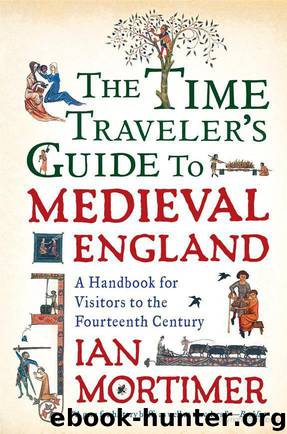The Time Traveler's Guide to Medieval England by Ian Mortimer

Author:Ian Mortimer
Language: eng
Format: mobi, epub
Tags: Europe, Medieval, A Handbook for Visitors to the Fourteenth Century, bought-and-paid-for, General, Great Britain, History
ISBN: 9781439112908
Publisher: Touchstone
Published: 2011-10-25T04:00:00+00:00
9
Health and Hygiene
If you are ever asked whether you would rather live in a past century you would be wise to consider the problem of ill health before answering. How much better to live at a time in which, when you fall sick, you go to a doctor or a surgeon and get well again. It has to be said: the prime reason to avoid medieval England is not the violence, the bad humor, the poor roads, the inequality of the class system, the approach to religion and heresy, or the extreme sexism. It is the sickness.
In almost every respect fourteenth-century life is unhealthy compared to our own. True, there are no exhaust fumes in the streets to pollute your lungs, and no tobacco smoke for that matter either; but there are open fires in many houses and the exposure to smoke for so much of the year causes lung diseases of a similar nature. There may be no fish-killing chemicals accidentally released by pharmaceutical companies into the rivers, but there are all sorts of other things which get into the water supply, from overflowing cesspits to dead animals. Children do not suffer from allergic reactions caused by dust in wall-to-wall carpeting or the excessive use of cleaning fluids, but you can hardly say that that is a good thing when nearly half of them do not live to adulthood. Very simply, if you do fall ill, or are seriously injured, you are going to suffer far more in medieval England than in the modern world.
Ideas of Illness
Why might you fall ill? There are, of course, many reasons. Not least is the likelihood that you will be struck by a blade, an arrow, a staff, or even a cannonball. The violence inherent in society, coupled with a near-complete disregard for what we think of as health and safety, mean that serious injuries are very common. In addition, even where such injuries are not fatal, poor knowledge of medicine and hygiene means that blood poisoning often leads to death or the amputation of a limb. There is very little understanding of how diseases spread or how the body functions. Hospital staff often put seriously ill people in one bed together, even when they are suffering from infectious illnesses. Germ theory is unknown. The circulation of the blood is a complete mystery. If you are found in a comatose state in 1300, no one will check your pulse to see whether you are still alive; instead they will place a bowl of water on your chest, to see if you are still breathing.1 Medieval life might be unhealthy, but some medieval medical concepts are unhealthier still. Before long you will think of medieval medicine as a bizarre mixture of arcane ritual, cult religion, domestic invention, and a freakshow
The most common cause of illness is, according to most opinions, divine judgment. As God makes all things happen, so too all afflictions must ultimately come from God. Some people argue that, because God is a caring deity ill health and suffering must also have an origin in divine care.
Download
The Time Traveler's Guide to Medieval England by Ian Mortimer.epub
This site does not store any files on its server. We only index and link to content provided by other sites. Please contact the content providers to delete copyright contents if any and email us, we'll remove relevant links or contents immediately.
| Africa | Americas |
| Arctic & Antarctica | Asia |
| Australia & Oceania | Europe |
| Middle East | Russia |
| United States | World |
| Ancient Civilizations | Military |
| Historical Study & Educational Resources |
Room 212 by Kate Stewart(4099)
The Crown by Robert Lacey(4099)
Endurance: Shackleton's Incredible Voyage by Alfred Lansing(3834)
The Iron Duke by The Iron Duke(3636)
The Rape of Nanking by Iris Chang(3507)
Killing England by Bill O'Reilly(3448)
Joan of Arc by Mary Gordon(3253)
Say Nothing by Patrick Radden Keefe(3053)
I'll Give You the Sun by Jandy Nelson(2839)
Hitler's Monsters by Eric Kurlander(2727)
Shadow of Night by Deborah Harkness(2710)
Margaret Thatcher: The Autobiography by Thatcher Margaret(2680)
Mary, Queen of Scots, and the Murder of Lord Darnley by Alison Weir(2675)
Darkest Hour by Anthony McCarten(2643)
Blood and Sand by Alex Von Tunzelmann(2606)
Red Famine: Stalin's War on Ukraine by Anne Applebaum(2458)
Eleanor & Park by Rainbow Rowell(2387)
The One Memory of Flora Banks by Emily Barr(2344)
Book of Life by Deborah Harkness(2259)
